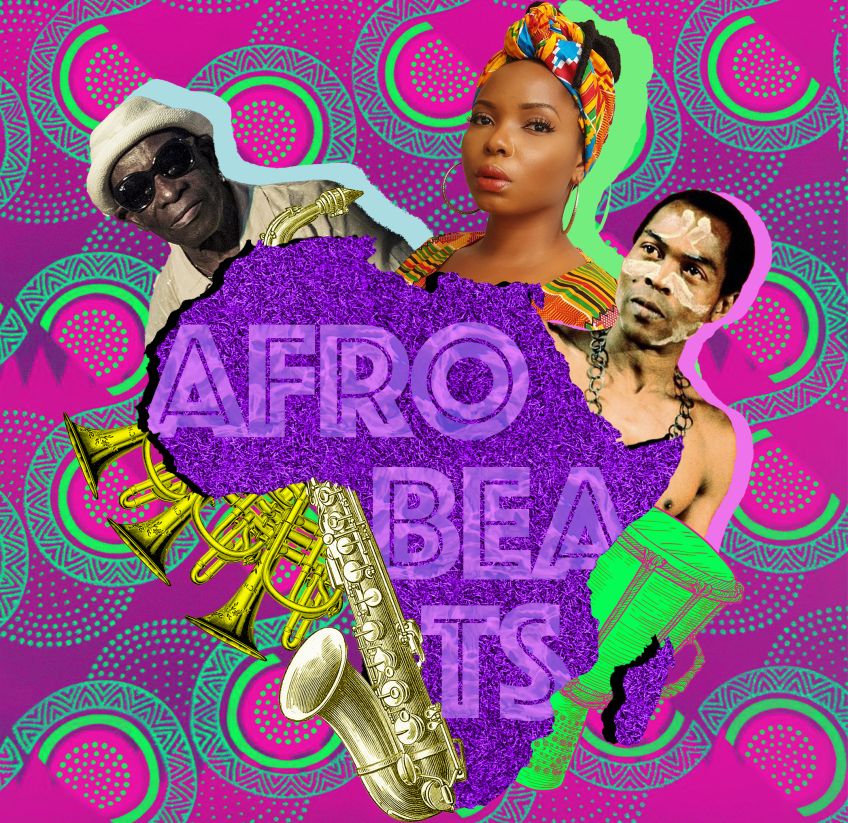The Gift
The Lion King: The Gift is a compilation album curated by Beyoncé, released alongside the 2019 remake of the animated film The Lion King. It centers Afrobeats and disseminates it to the mainstream Western market via Beyoncé’s broad fanbase, her high stature in the industry, and the film’s nostalgic resonance with the public. Speaking about her 2019 documentary Making The Gift, which details the story of each song featured on the album, Beyoncé marks the importance of having authentic African artists collaborate and create a sound that glorifies the shared heritage of Black peoples (Knowles-Carter 2019). She calls it “a love letter to Africa,” written by both African and African-American artists and songwriters alike – and the process of bringing them together in camps to create independent of labels, executives, and even Beyoncé herself is evidence.
Afrobeats
Origins
Described as “ a 21st-century melting pot of western rap influences, and contemporary Ghanaian and Nigerian pop music” by Dan Hancox in “The Rise of Afrobeats” in 2012, Afrobeats is a genre that has steadily reimagined its origins in politics, colonialism, and exposure to American culture. The father of its predecessor, the late Fela Anikulapo Kuti (1938-1997), almost exclusively used Afrobeat (sans the “s”) to comment on the political climate of Nigeria and global politics (Osiebe 88). Tendayi Sithole notes that “In a way, Fela’s music was not mere entertainment – but, pedagogically oppositional with the intention of unmasking the injustice of the African postcolonial state.” (Sithole 1) For context, Nigeria at this time would face political unrest, civil war, and multiple coups. Although never having truly thought of himself as African due to his Western education in London, political unrest in Nigeria caused a shift in Kuti’s sense of self, formed his political voice, and heavily influenced his music, Afrobeat, which at this time was a “mesh jazz and West African highlife.” (Langley 200) Some of notable works in his discography include Beasts of No Nation, Water No Get Enemy, and Shakara.
Today in Pop Culture
Even though Afrobeats has evolved from its origins, the essence of Fela Kuti’s influence is still present in this new branch of the genre. For example, artist Wizkid has the Afrobeat legend tattooed on his forearm and recorded Jaiye Jaiye in 2013 featuring Femi Kuti on the saxophone, Fela Kuti’s son (Osiebe 94). In her song Koroba, artist Tiwa Savage critques those who criticize young girls for dating rich Nigerian politicians, saying “We’re going to take our share of the national budget – because, you know, these politicians who’ve been stealing from us for so many years, and it’s time that, you know, we take our share, or we get the power back or the money back.” (Savage) This is an example of how new Afrobeats artists also use the genre to make a political statement. As Osiebe puts it, “Generally, popular musicians in contemporary Nigeria readily identify Fela as a source, or at the very least, one of their sources of inspiration.” (Osiebe 94)
Artists such as Burna Boy, Wizkid, Tiwa Savage, and more have emerged into the Afrobeats that we recognize today. However, the genre, as evident thus far, is certainly not new. As early as the late 2000’s, Afrobeats began to make a name for itself in the UK, first among black British people, then the country as a whole (Hancox). Beyoncé also has an unreleased Afrobeats project inspired by Fela Kuti. From this, listeners received End of Time on the 4 album, which was recorded at the same time as the Fela-Kuti inspired project (Mokoena). In addition, “her headlining Coachella (2018)performance interpolated Fela Kuti, which can be heard on the subsequent Homecoming film and album.”(Kim) In recent years, the genre has established itself in the American music industry. In “American Music Taste Finally Went Global in 2020” Emily Blake states that “Streams for Afrobeats and Nigerian music more than doubled in the U.S. compared to 2019, according to Alpha Data. Year-on-year, streams for Afrobeats rose 129%.” (Blake) This can arguably be correlated to the release of WizKid’s Essence featuring artist, Tems. The alluring, Afrobeats ballad is the first Nigerian song to enter the Billboard Hot 100 and the Billboard Global 200 (Anderson)(Frankenberg). The song has also been named the number one song of 2021 by The Rolling Stones (Blistein), was featured on former President Obama’s 2020 Favorite Songs playlist (Wonderland Magazine), and, last but not least, has been nominated for Best Global Music Performance by the 64th Grammy Awards season (2021 Grammy Winners).
A video clip from Beyoncé’s 2018 Coachella performance in which she interpolated the trumpet line from Fela Kuti’s Zombie.
An audio video of Fela Kuti’s Zombie, in which the interpolation from Beyoncé’s Coachella performance can be heard three times at 5 minutes and 23 seconds (5:23).
